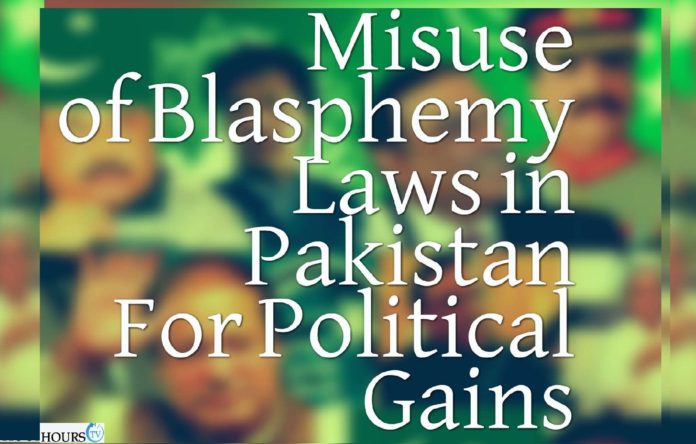Blasphemy laws in Pakistan are proof of how religious sentiments are exploited for the sake of political gains. The country that came into being in the name of Islam has no lack of political parties who use religion to grab the attention of masses. Even the mainstream parties that claim to offer justice, prosperity and a society purged of poverty, don’t refrain from using religion to point score against the opponents or gain the popularity of masses whose religious sentiments are easy to exploit.
Misuse of Blasphemy Laws in Pakistan
Blasphemy laws in Pakistan and even other countries are much controversial. Every discussion on their necessity begins from the religious rights of individuals and gives rise to debates on the subjects like freedom of expression and its relation with the right to offend. Therefore, making these laws needs to take into account the fact that they must not violate someone’s right, or they shouldn’t allow the ruthless exploitation of a person in any way,
Unfortunately, in Pakistan, there has been a history of misusing these laws for taking personal or political revenge. Such exploitation is not particularly subjected to blasphemy laws only, but it applies to religious laws in general.
Tehreek Labaik Ya Rasool Allah in Pakistan is the recent political party that has tried to exploit the religious sentiments for political reasons. The party’s leadership along with its emotionally charged followers crippled the life in Islamabad, the capital of Pakistan during 20-days long Faizabad sit-in. TLP demanded to reverse the changes in Khatm-i-Nabuwwat Oath in Election Act 2017.
Party’s leadership that constituted the religious clergy provoked the mob and gave an impression to the public that government was committing blasphemy through changes in Khatm-i-Nabuwwat Oath Act 2017. The sit-in didn’t seem to be anything more than an attempt to make the political atmosphere of Pakistan stormier after Panama case verdict.
The outraged people whose understanding of the religion is limited to the fact that blasphemy is a criminal offense didn’t bother to know the facts and thought it a religious duty to persecute the government officials and political leaders by accusing them of committing blasphemy.
One such example is the recent attack on Pakistan’s Minister for Planning and Developmemt Ahsan Iqbal by a youngster. The accused who was arrested by Police at the spot has admitted taking inspiration from the likes of TLP leaders like Khadim Rizvi who provoked people against the government for allegedly making changes in Khatm-i-Nabuwwat Oath.
The behavior of Political Leaders
It is ironic how religious clergy first asks people to believe in a divine power that can safeguard their interests, and later asks them to stand for that divine power to protect its interests against the evil. Well, that debate is irrelevant but what calls for a grave concern is the attitude of leaders towards such provocations. The recent example is the statement of PTI leader Abrar ul Haq on the matter of the attack on Ahsan Iqbal.
The singer did condemn the attack in a tweet. But Twitter users don’t seem to be happy with the way he has tried to blame the victim for what happened. Abrar ul Haq’s statements are nothing less than political point scoring by saying that the PML-N government had invited trouble by changing the Khatm-e-Nabuwwat Oath. Giving such remarks on media channels is indeed a way to provoke the sentiments of the masses who don’t bother to take a dig into the matter and believe what leaders are saying without making any logical link.
I am stunned by the audacity of Abrar Ul Haq to stand outside the hospital and actually blame the person who got shot for getting shot. I mean that takes a special level of sick minded person to do that but then again, that is what the handlers opened the doors for #Pakistan
— Adnan Rasool (@adnanrasool) 7 May 2018
https://platform.twitter.com/widgets.js
Abrar Ul Haq is live on channel 7 and telling the anchor that people frm Narowal are calling him and justifying the attack on #AhsanIqbal @betterpakistan and Abrar is telling PML N to stay cautious, it feels like Abrar is Khadim Rizvi! @Xadeejournalist @PTIofficial @MJibranNasir
— Syed Foaad Hassan (@FoaadHassan) 6 May 2018
https://platform.twitter.com/widgets.js
Blasphemy Laws in Pakistan
Blasphemy laws in Pakistan date back to the British era, when the government reportedly introduced them to prevent religious violence. That time these laws were less stringent and subjected the life imprisonment of up to 10 years with or without fine, to those who committed Blasphemy.
Stringent blasphemy laws in Pakistan in the form of section 295-B and 295-C were introduced in the era of Zia ul Haq who tried to appease the hardliners and bring so-called Islamization in the country. These laws made it a criminal offense to pass derogatory remarks against the Holy Prophet (PBUH).
Data from the NCJP (National Commission of Justice and Peace) reveals that almost 683 Muslims, more than 430 Ahmedis, 187 Christians, and nearly 21 Hindus have been accused of Blasphemy since 1987.
According to reports, courts heard the 10 Blasphemy cases between 1927 and 1985 but handled more than 4000 such cases from then onwards.
Reports also show that till now no accused has received the death sentence because in most of these cases courts found out fabricated evidence aimed at leveling the personal revenge.
Religion is indeed a sensitive matter, therefore no one should be allowed to use it for political point-scoring and misguiding the mob in a way that ends up distorting the peace in society.
Recommended For You:


